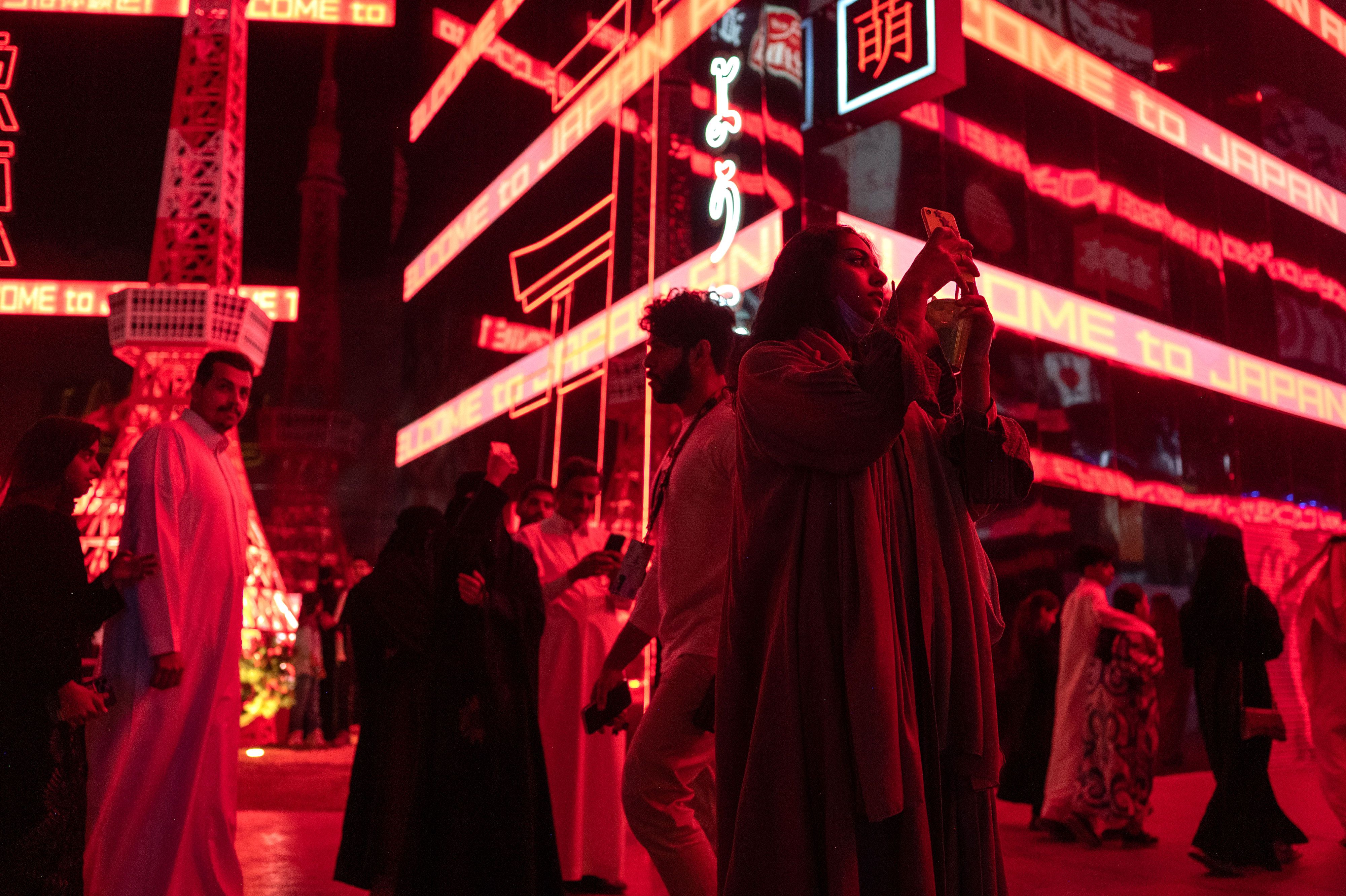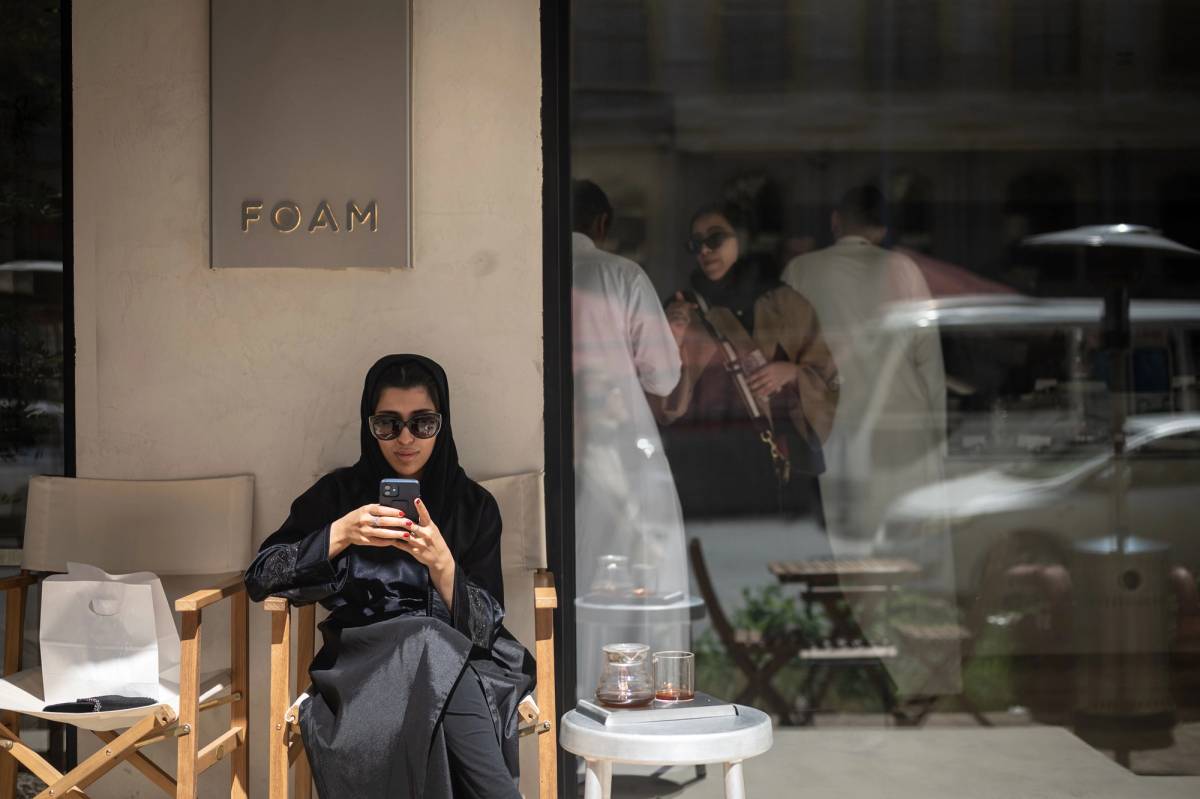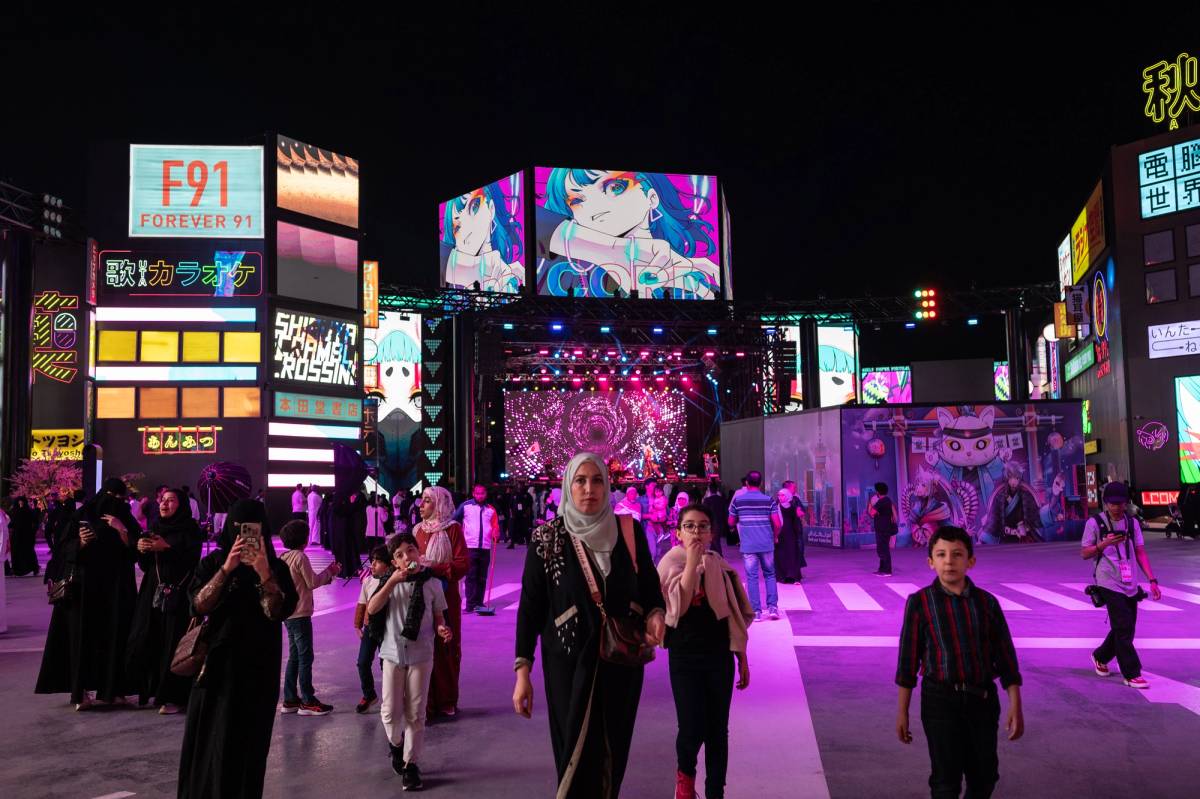Who Does Saudi Better: Google or Reddit?
As the kingdom goes digital, the best information is not where you might think




My pre-trip research before arriving in Riyadh was the usual Reddit-Google-TikTok expedition. What’s Saudi Arabia like? and safe + Saudi Arabia + Jewish woman.
The results were mixed. Google suggested that anything and everything is fair game for government surveillance, especially when it comes to Americans, so to be careful. Culture clash, it warned, in bright red letters.
The first page of results was littered with stories about American citizens being detained for edgy tweets and government-owned websites warning about potential “breaches of etiquette” that could earn you a hefty fine, or worse. (“Worse,” of course, was up to the reader’s imagination.)
One such faux pas apparently was using disabled restrooms if you weren’t disabled. Another was bringing in controlled substances—even vitamins required a doctor’s note. A worried Canadian travel blogger implored his countrymen not to wear shorts.
But Reddit and TikTok—more current, perpetually updating—showed a different side of the kingdom.
On Reddit, Saudis laughed at anxious American tourists asking if their social media would be audited upon arrival (“lol u think KSA is a police state?” one user retorted, “we don’t care about some random american, just have fun”). On TikTok, middle schoolers showed off trendy sneakers and weekend trips to Al-’Ula, an ancient Arabic oasis city near Medina, occasionally coming into the camera’s view to ask their audience which international school they thought was the most toxic. European expatriates, mostly women, vlogged from big cities like Jeddah and Riyadh about how moving to Saudi Arabia had liberated them.
They’re more conservative, the women all seemed to agree, but it’s safer here.
Many talked about the recent reforms—mostly those concerning Western clothing—but just as many preferred to don a hijab and abaya, or even a niqab, even if they hadn’t converted to Islam (though some had done that too).

Social media assuaged some of my anxiety, but you never know until you’re there, do you? I’d been surprised during these types of trips before. Just two weeks prior, I’d had an awkward back-and-forth at a Cuban airport with a customs agent about how I was more of a blogger than a journalist per se. (The conversation ended with the misconception that I was writing a book about penguins. It’s a long story.) But the sort of conversation that was funny in Cuba, I worried, might have legal consequences in Saudi Arabia.
The night I arrived in Riyadh, a friend back home shared a lurid story over the phone about a man she’d slept with the night before. Nothing unusual, a drunken hookup gone awry, the kind of garden-variety pornography that 40 years ago you might have only been able to read about in Penthouse, but which today circulates like it’s nothing. Another friend texted me a “politically insensitive” meme referencing the events of the summer of 2020 (you don’t need me to tell you anything else). It sounds silly now—but I was generally nervous this would trip some kind of switch, and mark me as a disrespectful guest in the country.
So I found myself in Riyadh, excited but cautious, not in the “use-your-best-judgment” casualwear that Reddit assured me would be fine, but in a plain black abaya with a scarf around my neck—just in case Google was right—and anxious about maintaining proper phone hygiene. But the longer I was there, the easier it was to see that the Redditors were right.
The first thing you should know is that all those stereotypes about Middle Eastern hospitality are true. It was hard for me to feel truly alone in Riyadh—how I might feel alone on a bad day in Paris or Tokyo. Perfunctory “good afternoons” could extend for as long as you allowed them to. In a salon, arguably the best place in any city for talking to strangers, I chatted about life in Riyadh with a hairdresser in her early 30s for three hours.
“It’s an international city,” she told me, “It’s our New York.”
People come to Riyadh from all over the Middle East, she explained. According to the U.N.’s 2022 World Migration Report, Saudi Arabia as a whole is the third-most-popular destination in the world for international migrants (as you can tell just by looking at a crowd). As my hairdresser described it, there was more opportunity there, more culture. Better art; good food; better jobs; more things to do. Not least, it was safe—the same thing I kept hearing about from Western expats online.
She felt safe walking alone at night; she felt safe doing just about everything except driving. And that was just because of the traffic, which, in my opinion, competed with American cities like Atlanta and Los Angeles with how unrelenting it could be. (My hairdresser theorized that traffic got worse when women started to drive in 2018.)
She also seemed to think that Riyadh is designed for people who are from the Arab world—that some of its opportunities and enchantments might not be immediately visible to Westerners. Her impression was that I was probably getting the “English menu,” so to speak.
“It’s our New York,” she reiterated.
But, she added, if I wanted to learn about the social scene in Riyadh, online meet-up groups were a good place to start—and if I spent enough time there, the city would start opening up to me. She asked if we had those in the United States, and I said yes, but they were seen as a last resort. The kind of people who use meetup.com are usually a little awkward. She said it isn’t the same in Riyadh: “It’s good for immigrants.” She also recommended I check out the Snapchat map to see where people are hanging out.
She was right. There was activity everywhere, showing people hanging out with friends, going to comedy clubs, drinking halal nonalcoholic beer at “pubs” designed to mimic the experience of a Western night out without being haram.
It reminded me of the early days of Craigslist, back when people still used it to find DIY shows or parties. (Also like early Craigslist, there were a shocking number of ads for prostitutes, another story for another time.) As it turns out, Snapchat has a staggering 20 million active users in Saudi Arabia—57% of the population—and its imprint is everywhere. In any long line, any bus ride, any lull in a café or hotel lobby, you’ll see multiple people using it.
Saudis use Snapchat for dating, too, often preferring to swap Snapchat handles to exchanging phone numbers. Less commitment, with the added benefit that messages can disappear. I wondered if that, too, is a result of the country’s recent reforms—if Saudis are using Snapchat with the same implications and connotations of romantic casualness that Americans do, at least in some respect. I didn’t have the guts to ask my hairdresser about that one, though an artist friend who had recently visited Riyadh offered some clues. He described a birthday party he attended in Jeddah where people were “secretly drinking” and showed off the Instagram of a woman he’d met there.
My hairdresser did tell me that some Saudis use Tinder and homegrown Tinder clones, which I found surprising. A part of me wanted to set up a sock puppet profile to see what the energy was, but I didn’t have the guts to do that either, and I also figured that not knowing Arabic would make it a futile journey anyway.
Some of the dating culture was visible in public, though.
Young couples canoodled in the crowd at a Charlie Puth show in Jeddah, which felt more like a rich kid’s bar mitzvah than a concert. They didn’t kiss, but they brushed up against it; the space was abuzz with youthful sexual tension that felt like it could easily bubble over into telepathy. One look, and you know exactly what your boyfriend or girlfriend is thinking. There were some signs of it at the Saudi Grand Prix, too—young girls, maybe 16 or 17, dressed more provocatively than I expected, chatting carefree with their male peers. Girls who seemed as young as 13 or 14 wore trendy makeup styles I recognized from TikTok influencers. By the way, have you ever seen a hijabi e-girl?
Social media seems to play a big role in the youth culture, even beyond Snapchat’s massive reach. Malls carried all the same fast fashion you’ll see stateside (some were surprisingly provocative), cafes blasted trending songs on TikTok, and teens filmed Instagram reels everywhere they could get away with it.
My favorite example of this was a café called EL&N. In the language of TikTok and Pinterest, EL&N is barbiecore. In normie English, it’s whimsical, pink, the very picture of girliness. Most importantly, the menu is organized by which social media platform each dish is best for. There are Instagrammable lattes, hot chocolates designed for Facebook, and TikTok-perfect desserts. The jury’s out on whether the food tastes good, but it was nothing if not aesthetic.
Saudis are interested in more about the internet than just social media, though. Popular streaming platforms such as Netflix enjoy widespread popularity in Saudi Arabia, where shows like Outer Banks top charts.
And then there’s anime. The “weeaboo” or “otaku” community in Saudi Arabia is booming. On people’s shirts; on charms dangling from women’s purses or kids’ smartphones; pins and keychains on backpacks; in grocery store tchotchkes, anime is everywhere in Riyadh and Jeddah. You’ll even see the occasional cosplayer if you pay close attention.

While anime has been popular in Saudi Arabia since the 1970s and 1980s, the country now boasts the largest anime fanbase in the Middle East and a growing industry to cater to them. This includes streaming platforms like AnimeKey and MBC’s Shahid, and events like the Saudi Anime Expo.
Zanib, an employee at Boulevard World’s “Anime Town,” an anime-themed pavilion at an amusement park styled after Epcot, echoed this sentiment. Saudis love anime, she told me—they’re the biggest weeaboos around. Even government officials promote it. “Ditto for K-pop,” she added, which tends to be a sister interest to anime.
In Riyadh, there’s an anime-themed café called Konime, and about half a dozen dedicated stores, like Animation Theory and Geek Dimension. According to Zanib, though, the real otaku community is in Jeddah. Not only are there more stores, events, and conventions, but “that’s where people are meeting up and discussing anime.”
The Saudi love of anime extends beyond just consumption. Manga Productions—a company owned by Crown Prince Mohammed bin Salman’s MiSK Foundation—collaborated with Japan’s Toei Animation to produce The Journey, an award-winning anime that tells the story of a pre-Islamic battle over Mecca from a Saudi perspective. (I can’t help but wonder if KSA has the same purposeful, propagandistic perspective on “kawaii” anime mascots as Japan—call it “cute-washing.”)
None of this means that Saudi Arabia is uniformly “more liberal” than its reputation, at least in the way a Westerner might think. I suspect many of the more liberal attitudes—the slightly more provocative clothing, the attention to social media, the openness to a more Western style of courtship—are concentrated among the upper classes, or at least the metropolitan centers. Formula One, for example, isn’t exactly accessible to everyone; nor are the upscale malls of Riyadh and Jeddah.
Whenever I visited a tourist hotspot, like Boulevard World, famous souks, or the UNESCO World Heritage Site of Diriyah, I saw plenty of niqabs. I saw more prayer and more visible sex segregation. At least in public, these Saudis were more reserved than the cosmopolitan youth vanguard I’d met elsewhere, though in no way hostile. Which was the real Kingdom of Saudi Arabia?
It was hard to tell, and perhaps there’s no correct answer to that question. No matter where I was, though, and no matter who I was surrounded by, I felt welcome. Safe + Saudi Arabia + Jewish woman? As the Redditors proclaimed: absolutely.
Katherine Dee is an internet culture reporter and advice columnist. You can find her at defaultfriend.substack.com.